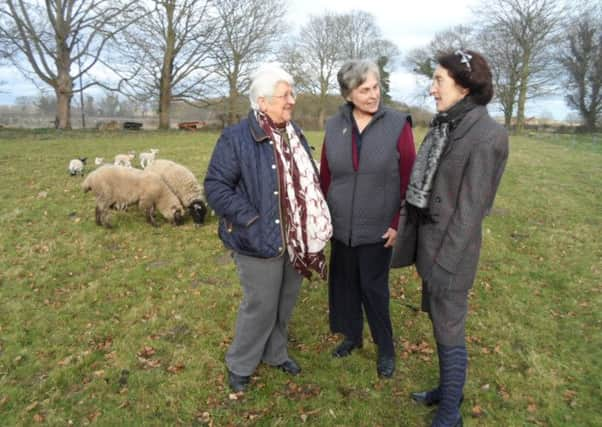Women turn the spotlight on food


Forget jam and Jerusalem and Calendar Girls, the WI is making its case for greater discussion on how the world’s rising population will be fed in the years to come.
Their aim is to set the ball rolling on what they consider to be a massive problem and next Thursday the North Yorkshire East Federation will be hosting what they hope will be a full house for the WI Great Food Debate in Sheriff Hutton Village Hall. It’s open to all and speakers include representation from the National Farmers’ Union, Defra, scientists, students and farmers.
Advertisement
Hide AdAdvertisement
Hide AdAmong those involved is Bradford-born Glenys Wedzicha is a member of Copmanthorpe WI and has had a successful career as a scientist, having graduated at London University and earning a doctorate in chemistry.
“We are concerned about sustaining a reliable food chain. If you look to the future this planet, barring accidents or incidents is going to increase to a predicted population of 9.2bn (presently 7.15bn). I was at a lecture recently and a gentleman demonstrated one of the problems that will face the generations when we are gone. He showed an apple to represent the globe and on it was one small speck of brown. He believed that speck would be the available land to grow further food.”
That may have been an exaggeration but Glenys believes action should be taken now to avert an anticipated shortfall and believes science has a key part to play: “You cannot exclude the scientific approach to the dilemma the world faces. Science is at the base of food production. There will be different forms of food needed and I don’t see any problem with such as genetically modified (GM) crops. If this is one of the options available I don’t think we’re in a position to turn aside from it. I don’t know too much about GM but what I do know is that I’m willing to find out, and yet there are many who won’t even listen to what it is about.”
Margaret Jackson is a farmer’s wife married to Robin, their Woodside Farm includes 400 Suffolk X ewes and a variety of crops and grass. Margaret was a housecraft teacher from Leeds and her father had a pork shop in Pudsey. Today she is involved with WI Country Markets, selling produce in Easingwold parish rooms on the first and third Friday each month. She also feels that GM crops could be one of the answers: “If we want more food we have to find better ways of growing more of it. GM crops are not treated by as many chemicals and that means they can be grown more safely, but there are many other things that we can do be doing already such as not throwing away as much food as quickly. Even just the little things such as putting fresh items at the back of what you have in your cupboard or fridge would help. My mother always put the date of when she had bought something on the packaging or the paper bag.”
Advertisement
Hide AdAdvertisement
Hide AdNorthallerton-born Freda Shaw lectured in agriculture for many years after studying at Harper Adams. Her parents had a pub and 50-acre farm. A member of the Byland with Wass WI, she is concerned for how farmers are going to be able to help in increasing production.
“Farmers will tell you that they are struggling to keep food production at the level we need largely through government legislation and the cost of everything from red tape and upkeep. We’re not self-sufficient here in the UK. If we couldn’t import food then I’m informed that what we have here would only last us six months. There’s competition for what is grown on the land today. Non-food production such as biomass is grown and is encouraged, but you can’t eat that; and land prices are going up, making it less likely that food producers are going to be able to buy additional land. All of this reduces the amount of land available for food production.”
The WI Great Food Debate takes place at Sheriff Hutton Village Hall next Thursday 27 March starting at 6.30pm. It is an open meeting.